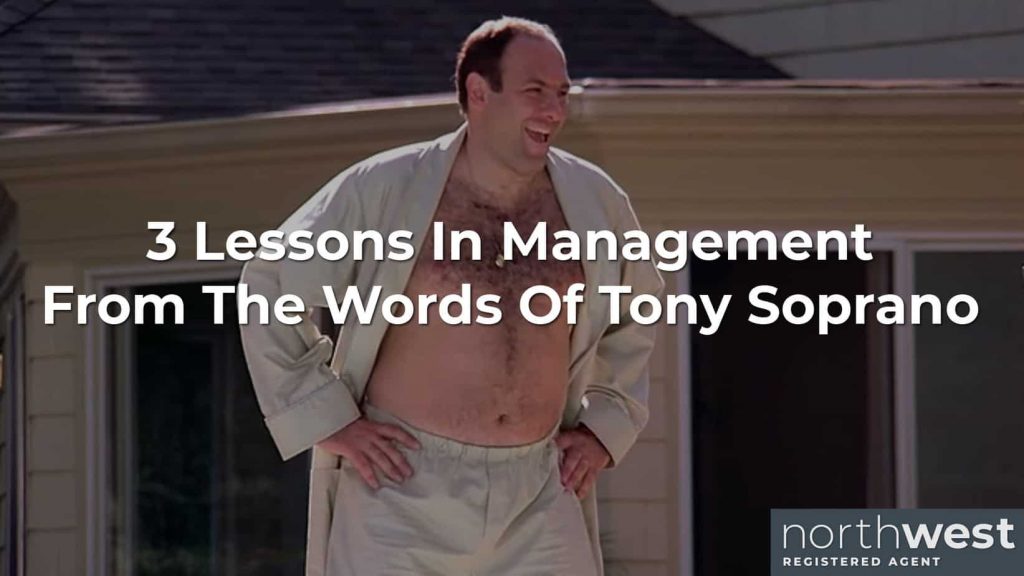3 Lessons In Management From The Words Of Tony Soprano

Today there are so many different television shows that even the starchiest of couch potatoes can’t keep up on everything. That’s why I find myself rewatching series instead of bravely trying out new ones. The latest of these repeat binges was one of my all time favorites, HBO’s The Sopranos. The series follows Anthony Soprano, a respected Mafia boss, father, and husband who had such trouble handling all three duties that he seeks psychological therapy halfway into the pilot. The late James Gandolfini’s portrayal of the complicated and deeply flawed mob boss has done more than stand the test of time. It proved you could base a successful show around an antihero, with an emphasis on “anti.”
Antihero or not, there’s a lot more to learn from Tony Soprano than just Italian curse words. If you look past the nefarious nature of Tony’s work, he’s essentially just a small business owner tasked with managing and motivating his small team. His successes and failures as a manager are shown in great detail over the course of the series, along with the consequences therein. Three of Tony’s quotes particularly stood out to me for their managerial insight. In typical Soprano fashion, Tony yells all three sternly while condescendingly pointing an index finger.
1. “Those who want respect, give respect—and you’ve given me nothing but a migraine!”
When a member of Tony’s crew criticizes him for not respecting his wishes, Tony claims that since his subordinate has only caused him anguish lately, he wasn’t deserving of any of his respect. This is a prime example of Tony Soprano showcasing a flaw in his management approach. It’s likely that even your best employee will manage to give you some degree of a migraine one day, but it’s your response to it that dictates your effectiveness as a manager. You should always treat your employees with respect, even in times of reprimand. When you’re respectful to your employees, it’s easier for them to be receptive to criticism and last second changes. This keeps your workforce more adaptive and productive. If you’re respectful of your team members, you can expect the best kind of respect in return: results.
2. “A wrong decision is still better than indecision… or whatever, I don’t know!”
This idea—that any action is better than inaction—has been around since long before Tony Soprano muttered it in between bites of eggplant parmesan. While it’s of course important not to overreact or react without all the necessary facts or research, Tony hit the nail on the head when it comes to one of the biggest problems many small businesses face: fear of making changes.
Whether it’s issues with employees, clients, or vendors, the last thing you should do as a small business owner is let personnel problems go unmediated for too long. A single day of poor workmanship, or a late delivery can turn into months of the same if a manager doesn’t address the individual at fault. When addressed quickly and respectfully, a good employee will be more mindful and improve your team. An employee or third party that repeats their mistakes (in spite of your previous addresses) can be reprimanded or reassigned with a much clearer conscious.
Being decisive isn’t just important for when things go awry; it’s important that small business owners use the same haste to strengthen their team when the opportunity presents itself. As things often spiral out of control in Tony’s business, he’s reminded of his past management mistakes and isn’t afraid to make difficult, unpopular decisions regarding his workforce in order to not repeat them. Throughout all six seasons, Tony’s hierarchy of henchmen shuffles dramatically. Tony always looks at the big picture and has no problem placing different people in charge of rackets or schemes they’re more suited for. This is done regardless of seniority or whether it irks his other soldiers. You should have the same mentality when managing your small business. If someone else seems capable of handling more, don’t hesitate to retask them immediately. If orders are piling up, and you’re too afraid to make significant changes such as expanding your workforce to meet demand, your business will suffer. The worst thing you can do is remain idle and keep wondering while your customers’ money goes elsewhere.
3. “If you can quote the rules, then you can damn-well obey them!”
Tony has it absolutely right here. Everyone should know the rules, and everyone should follow them—whether it’s the newest employee or the CEO. It doesn’t matter if you’re the boss of an organized crime syndicate or a food truck, you’ll need to lead by example. When managing your small business, it’s not enough to make sure your employees are briefed on company policy and expectations. You should hold yourself to that same standard, or higher.
Despite offering up such a powerful lesson, this lesson is one Tony Soprano unfortunately fails to learn. The hypocrisy he displays to his underlings causes him far more grief then the FBI, or rival gangs combined. Tony spends every season fending off mutineers and dissenters that eventually grow tired of him setting rules and expectations that he himself refuses to follow. That’s where the lesson is. Want your team to get to work on time every day, etc.? You better set your alarm.
I’d never advocate that you copy Tony’s exact management style. After all, your employees would quickly tire of barked orders, your paranoid aversion to talking on phones, and the secondhand smoke from your incessant cigar smoking. Tony Soprano as a fictional character is interesting because all of his flaws were put on full display for our viewing pleasure. He’d often follow up strides of strategic brilliance with moments of managerial incompetence. All the while, everyone was to blame but himself.
Simply put, Tony Soprano isn’t the best example of an effective manager. He’s an entertaining exposé on both what to do and what not to do as a manager. He’s the criminal equivalent to both Goofus and Gallant. This interesting dichotomy has kept The Sopranos binge-worthy 20 years after its premiere, and brought beloved characters such as Walter White and Donald Draper into existence. It’s that same dichotomy that can teach a small business owner a few things about management as well.



